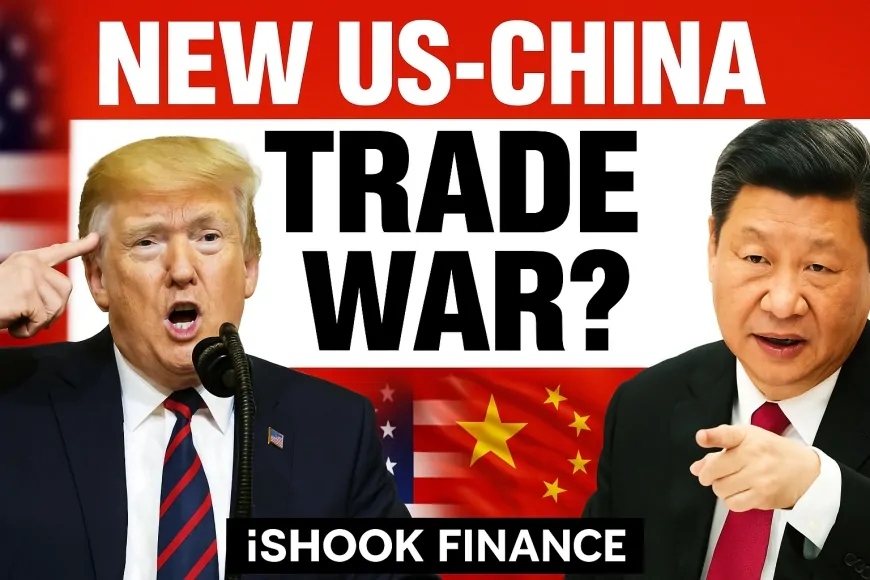China Targets U.S. Firms With New Export Bans and Trade Restrictions
China bans 12 U.S. firms from key exports and blacklists 6 others from trade and investment, escalating tensions with Washington.

China has imposed fresh trade restrictions on several American companies. The Chinese Ministry of Commerce announced on Wednesday that it had updated two of its most serious regulatory lists: the export control list and the “unreliable entities” list.
The updated sanctions will go into effect on Thursday, April 10.
12 U.S. Companies Blocked From Importing Sensitive Chinese Goods
A total of 12 American companies were added to China’s export control list, which prohibits them from purchasing “dual-use” items from Chinese firms. Dual-use items refer to goods and technologies that can serve both civilian and military purposes.
The companies affected include:
-
American Photonics
-
Novotech
-
Teledyne Brown Engineering
-
Insitu (a Boeing subsidiary)
-
TCOM, Limited Partnership
-
Stick Rudder Enterprises LLC
-
Huntington Ingalls Industries Inc
-
S3 AeroDefense
-
Cubic Corporation
-
TextOre
-
ACT1 Federal
-
Exovera
These firms will no longer be able to access certain Chinese technologies, components, and systems — which may affect their production timelines and overseas operations.
6 Companies Completely Blacklisted From China
In addition to the export ban, China has taken an even more severe step against six other U.S. companies by placing them on the “unreliable entities” list. Companies on this list are banned from:
-
Conducting import or export activities with Chinese businesses
-
Making new investments in China
-
Participating in joint ventures or partnerships
-
Sending or employing staff in China
Executives at these companies may also face visa denials, residency bans, and other administrative penalties.
Blacklisted companies include:
-
Shield AI
-
Sierra Nevada Corporation
-
Planate Management Group
-
Inter-Coastal Electronics
-
System Studies & Simulation (S3 Inc.)
-
IronMountain Solutions
These firms are mostly involved in aerospace, defense, and military technologies — sectors at the core of recent friction between Beijing and Washington.
A Direct Response to U.S. Export Controls
The latest action from China appears to be in direct response to U.S. efforts to curb Chinese access to advanced technologies, particularly in areas like artificial intelligence, defense, and semiconductors.
In recent years, the U.S. has blacklisted multiple Chinese companies such as Huawei and ZTE, citing national security concerns. It has also tightened rules around chip exports to Chinese buyers, especially those with military links.
Beijing’s new sanctions seem designed to mirror those restrictions — targeting American companies in similar sectors.
Experts Say This Could Affect Global Supply Chains
Trade analysts say the move could cause ripple effects throughout global supply chains, especially in industries tied to aerospace and military contracting. Several of the companies on China’s lists supply parts, software, and services to major defense programs and commercial aviation projects.
“Even if the direct impact is limited to a small group, the broader message is that doing business across U.S.-China lines now carries real regulatory risk,” said a Washington-based international trade advisor. “Companies will have to rethink their supply chain resilience and exposure.”
Business Environment Grows More Uncertain
China’s decision adds to the growing sense of uncertainty for American businesses operating abroad. While some companies have already begun diversifying their sourcing and manufacturing operations, others may now need to consider scaling back their exposure to the Chinese market.
At the same time, Chinese firms and government departments may also become more cautious in dealing with U.S. counterparts, fearing retaliation or compliance issues.
This situation puts additional pressure on multinational companies that have to navigate sanctions, regulations, and market access restrictions on both sides.
Will This Escalate Further?
Many observers believe this is part of a longer-term shift rather than a one-time retaliation. With both the U.S. and China increasingly linking national security with trade policy, further sanctions or countermeasures could follow — especially during sensitive political periods like election cycles.
Some U.S. lawmakers have also called for stricter actions against Chinese entities, including bans on investment and access to critical U.S. infrastructure.
If the current trend continues, the global economy may see more fragmentation in trade partnerships, investment flows, and tech collaboration — with companies caught in the middle.
While the full impact of China’s latest sanctions will take time to assess, one thing is clear: the U.S.-China trade relationship is entering a more complex and confrontational era. Companies in sensitive industries, particularly tech and defense, will need to pay closer attention to evolving policies — not just in Washington or Beijing, but globally.
Also Read: US Hits Chinese Imports with 104% Tariff, China Plans Hit Back with Export Limits































































